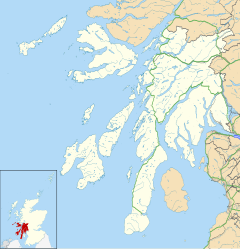Fionnphort
| Fionnphort | |
|---|---|
 The view towards Fionnphort, from Tor Mor quarry |
|
| Fionnphort shown within Argyll and Bute | |
| Population | 80 (approx.) |
| OS grid reference | NM301232 |
| Council area | |
| Lieutenancy area | |
| Country | Scotland |
| Sovereign state | United Kingdom |
| Post town | ISLE OF MULL |
| Postcode district | PA66 |
| Dialling code | 01681 |
| Police | Scottish |
| Fire | Scottish |
| Ambulance | Scottish |
| EU Parliament | Scotland |
| UK Parliament | |
| Scottish Parliament | |
Fionnphort (English pronunciation: /ˈfɪnəfɔərt/, Scottish Gaelic pronunciation: [ˈfjun̪ˠafɔrˠt̪]) is the principal port of the Ross of Mull, and the second largest settlement in the area (its population is approximately 80). The village's name is the anglicised pronunciation of the gaelic for "White Port" and previous names have included Caol Idhe, gaelic for "Sound of Iona".
Historically, Fionnphort has been a fishing village offering religious pilgrims and tourists access to Iona; more recently, it has facilitated the movement of stone from a quarry in the vicinity. The granite which was extracted from Tòrr Mòr Quarry until around 1907 was highly prized for its density and hardness.
The beach at Fionnphort has a distinctive split granite boulder in the centre that is classed as an erratic and deposited here by an ice age glacier. The beach has a car park and a nearby cemetery.
From Fionnphort, the entire east side of Iona can be seen, including Iona Abbey. To the south of the village lies the district of Fidden and the island of Erraid, mentioned in Robert Louis Stevenson's novel Kidnapped and accessible to walkers at low tide.
Fionnphort has an active fishing industry, noted principally for shellfish, particularly crabs and lobsters, the majority of which are exported by container truck to Spain and France.
...
Wikipedia

